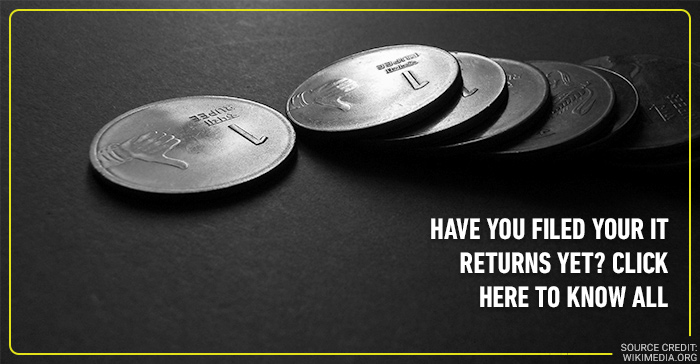Filing Income Tax returns - What you should know

Most taxpayers pay their taxes well before the end of the financial year i.e. 31st March. For salaried employees, it gets deducted through TDS and gets paid in regular instalments round the year. But when it comes to filing for Income Tax returns, many taxpayers tend to miss the deadline of 31st July. As per the I-T Act, a tax return may be furnished any time before the expiry of two years from the end of the financial year in which the income was earned.
Let’s understand what it means to file IT returns, and what happens in case you don’t file your returns before 31st July 2016.
What does filing tax returns mean?
A 'return of income' or tax filing is the process where a person reports or declares to the government, the details of their income and the taxes paid by them.
It is like the 'No Objection Certificate' you have to get from the college library, before you leave college even if you never visited the library. It is to establish the fact that don't have any outstanding obligation, or if there are any dues, they have been cleared.
What are the benefits of filling income tax returns (ITR)?
Filing IT returns is not a choice. It is a legal obligation which should be fulfilled by everyone who falls under the prescribed category. However, if you still needs more reasons to file your returns, here are a few:
To avail home or personal loans.
For visa and immigration processing.
It is an income proof or a net worth certificate.
For claiming excess tax paid via refund.
Applying for a higher insurance cover.
My tax is already deducted at source by my employer and paid to the government, then why do I need to file income tax return?
Although tax has been deducted and there is no further liability to pay tax, you have to compulsorily file your income tax return if your income exceeds the basic exemption limit.
I have not submitted my investment details like life insurance premium, to my employer and excess tax has been deducted from my salary. Can I declare my investments and claim the benefit?
Yes, you can claim a refund while filing income tax returns.
What are the different sources of income?
Before you start your tax filing, you need to first determine the sources of your total income. Does your income comprise of only salary and interest on savings bank account or you also earn rental income, capital gains, or income from any other source?
Let’s see different heads and “Sources of Income” as per Income Tax Act as follows:-
Salary
Rental income from house property
Profit & gains from business or profession
Capital gains on sale of shares or mutual funds or capital assets
Other sources like bank interests, etc.
You will need to add your income earned under each “Head” and then compute your taxes. If you have a minor child, don't forget to add the income received by him/ her. This will include income due to interest on fixed deposits in the name of your minor kid. For them, you're not expected to file separate returns; they can be clubbed with the parents' income.
What are the documents required before filing income tax return?
Form No.16: Issued by your employer summarizing your income from salary and tax deducted at source.
Form no 16A: Issued by all payers who have deducted tax while making payment to you during the year. For example, banks where you have fixed deposits.
Property details: If you have bought any property or put up existing property on rent, then the details for the rent received and receipts of municipal taxes paid during the year, will be needed. If you've bought property by taking a loan, then you'll need to submit copies of loan certificates for the interest and principal.
Contract Notes: For sale and purchase of shares during the year for calculating capital gains.
Tax challans: You'll need to submit the details of the tax payments made by you, if you've paid any advance tax or self-assessment payments.
Bank account statements: You will need bank account statements of all your operating accounts during the year for arriving at interest income earned during the year.
Others: Any other documents for a financial transaction involving tax implications for computing your taxes.
Note: You don’t need to submit any of these copies to the I-T department during the process of filing income tax returns, and even originals are also not required to be given to your CA, if you are taking professional help. These documents are only required to help you prepare your tax computation and you should keep these copies handy, in case the I-T department asks you to furnish them.
What will happen if you don't file your tax returns by 31st July?
Interest Penalty: If you have some outstanding tax liability arising out of income from other sources or due to change in jobs as seen in my previous article and tax is still due even after deducting advance tax and TDS. In this scenario, interest penalty will be applicable @1% per month u/s 234A and part thereof up to the date of filing of the return apart from the other interest amounts as applicable u/s 234B & 234C.
Late/belated return cannot be revised: A return is called a Belated Return if the same is filed after the due date. You cannot revise a belated return at a later stage. And a belated return can be filed within a period of one year from the end of the relevant assessment year or completion of assessment whichever is first.
Carry forward losses: Filing your return beyond a deadline will not allow you to carry forward your losses like long-term or short-term capital losses on Shares. But when it comes to carry forward of losses on house property, the same can be carried forward even if the Income Tax return is filed after 31st July.
Delay in getting Tax Refund: Your claim for refund will get delayed and you may also tend to lose interest on refund u/s 244A as delay in filing will be attributable to you.
Section 271F Penalty: If you do not file your return within a period of one year from the end of relevant assessment year then Assessing officer may levy a discretionary penalty of Rs 5000. For example, there will be no penalty if the return of income for the previous year ended 31st March, 2013 is filed by 31st March, 2014. If it is filed after that, the officer may levy this penalty which is mostly not exercised.
For any clarification on filing Income Tax returns, contact the accounts department of your organisation, or write to us on our Facebook and Twitter pages, or email us at jaagorein@gmail.com.You can also read more articles on Budget and Finance HERE
More about the Experts:
Share this story on






